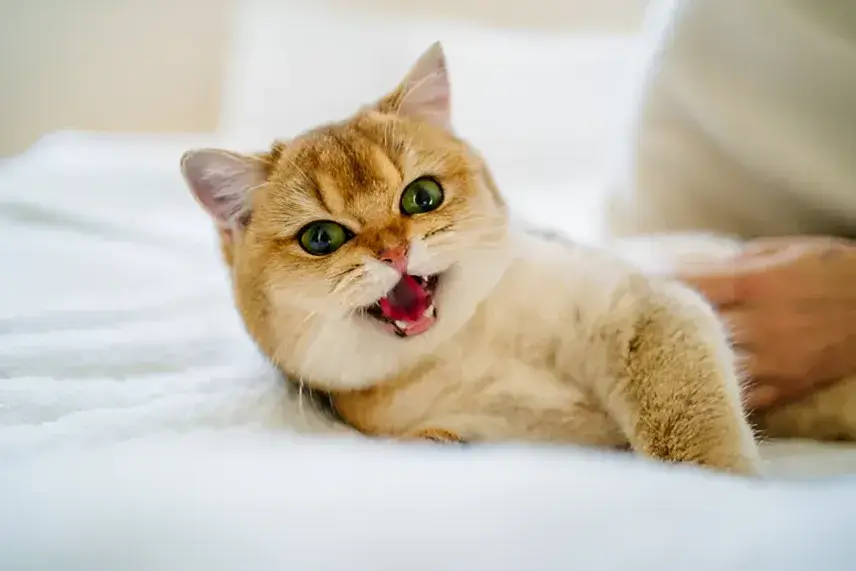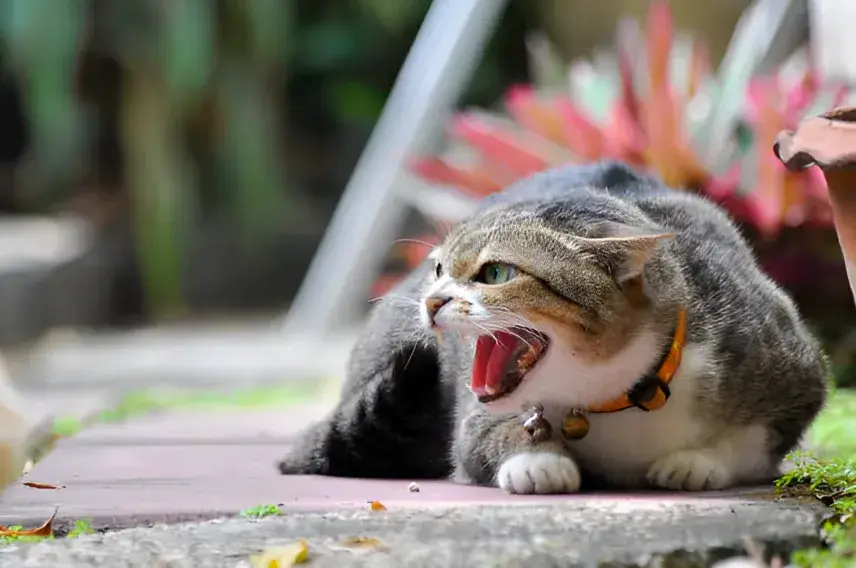Cats can be surprisingly vocal, and while meows and purrs are familiar, a growl might make you wonder what’s wrong. A cat’s growl is a clear warning signal. It means they are feeling uncomfortable, threatened, or even in pain. Let’s dive into the reasons behind growling and how to best respond to this feline behavior.
Decoding Your Cat’s Growl: Possible Causes
Fear and Anxiety: Cats may growl when they feel scared or threatened. This could be due to a new person, animal, loud noise, or an unfamiliar environment. Look out for accompanying body language: ears flattened, dilated pupils, tail tucked, and a crouched posture.
Territorial Aggression: Cats are territorial and might growl to defend their space against another cat, a dog, or even a human. This type of aggression usually involves a stiff posture, direct staring, and hissing alongside the growls.
Pain or Discomfort: If your cat is injured or unwell, they might growl as a self-protective measure or a reaction to pain. Look for other signs of illness, like lethargy or changes in appetite.
Playful Growls: Some cats get into character and let out low-key growls during playtime. This is usually accompanied by playful postures, bouncy movements, and no signs of fear or aggression.
Overstimulation Even the most affectionate cat can become overstimulated during petting or play. They may growl as a warning sign to stop the activity.
How to Respond to Your Cat’s Growls
Give Them Space: The most important thing is to back off and give your cat some room. Forcing interaction will only increase their fear or aggression.
Identify the Trigger: If possible, try to figure out what’s causing the growling. Is there a new pet in the house? Is your cat in a new environment? Is there a loud noise stressing them?
Address the Issue: Once you understand the trigger, take steps to address it. This might involve slow introductions, creating a safe space, pain management, or simply ending playtime.
Seek Professional Help: If the growling is frequent, severe, or accompanied by other behavioral changes, consult a veterinarian or cat behaviorist.
When to Be Concerned: Should You Seek Help?

While occasional growling can be normal, here are some situations where professional help is warranted:
- Sudden Changes in Behavior: Unexplained growling that’s out of character for your cat could indicate an illness or injury.
- Aggression Directed at People or Animals: If your cat’s growls escalate to biting or attacking, a behaviorist can help you understand and manage the issue.
- Growling during Routine Handling: If your cat growls when you try to brush them, pet them, or pick them up, there might be a medical cause.
My Cat Growls When… – Common Scenarios
My Cat Growls at Me When I Pet Them: Cats can become overstimulated by too much petting. Watch for signs like twitching tails, flattened ears, or a stiff posture. Shorten petting sessions and focus on areas your cat enjoys.
My Cat Growls During Playtime: Playful growling is often accompanied by playful body language. However, if it becomes intense, accompanied by hissing or biting, it’s a sign your cat is overstimulated. Take a break from play and try a calmer activity.
My Cat Growls at the Vet: Vet visits can be stressful for cats. Talk to your veterinarian about calming aids like pheromones or a medication to administer beforehand.
First Aid for Growling-Related Incidents
- If Your Cat Bites You: Clean the wound thoroughly, apply a bandage, and monitor for signs of infection. See a doctor if you experience any of those symptoms.
- When Cats Fight: Multi-cat households can experience occasional scuffles. Never intervene with your bare hands! Distract the cats or throw a blanket over them to break up the fight. Provide separate litter boxes, food bowls, and hiding spots to minimize future conflict.
A Deeper Dive into Medical Causes
While growling often signals a cat’s emotional state, it’s important not to overlook potential medical issues. Pain from conditions like arthritis or dental disease can make your cat feel grumpy and less tolerant, leading to growls.
Other health problems, such as hyperthyroidism, can affect a cat’s mood and make them more irritable. Regular veterinary visits, especially for older cats, can help uncover and address underlying medical problems that might be influencing your cat’s behavior.
Conclusion
Growling is your cat’s way of communicating a strong feeling. By understanding the triggers, observing their body language, and responding appropriately, you can maintain a harmonious relationship with your feline companion. Remember, patience and understanding are key!
The photo featured below the post headline is Credit: GluePromsiri/istockphoto
I hope you find this post helpful and informative. If Yes’ feel free to share it with your friends!
Frequently Asked Question
My cat growls at my new baby. What should I do?
Supervise all interactions closely and teach your baby gentle handling techniques. Create separate, safe spaces for your cat and ensure they have escape routes when feeling overwhelmed.
My cats growl at each other. Should I be worried?
Some playful growling is normal, but frequent, intense growling might indicate tension. Ensure each cat has access to its own resources (litter boxes, food, water, and hiding spots). Seek help from a behaviorist if conflicts persist.
Why does my cat growl when I pick them up?
Your cat may dislike how you are handling them, they may be in pain, or simply prefer not to be held. Experiment with different holding techniques and respect your cat’s preference if they want to be put down.
Why does my cat growl at me when I stop petting them?
Cats can become overstimulated by prolonged petting sessions. Watch for tell-tale signs like a twitching tail or shifting posture before they growl. Take breaks during petting and focus on areas they enjoy.
My cat growls at the window. What could be the reason?
Your cat might be seeing another cat, bird, or squirrel outside that it perceives as a threat or play target. It’s helpful to provide them with cat trees or shelves where they can observe the outdoors from a safe vantage point.
My cat growls and hisses at my other cat. Is this normal?
While occasional growling and hissing can be part of establishing boundaries, persistent aggression requires intervention. Separate the cats, provide them with their own resources, and consider having a behaviorist help with a careful reintroduction process.
My cat growls when I try to brush them. How can I help them feel more comfortable?
Some cats are sensitive to brushing. Offer short grooming sessions with gentle tools, associate brushing with positive rewards like treats, and respect your cat’s limits.
Is it normal for my cat to growl at the vet?
Yes, many cats experience fear and anxiety at the vet. Discuss strategies with your veterinarian to minimize stress, this could include calming aids, pheromones, or even home visits if available.
My cat seems to be growling for no reason. Should I see a vet?
Unexplained growling, especially if it’s a change in your cat’s behavior, warrants a veterinary examination. Medical conditions like pain or neurological problems can contribute to increased irritability.
My cat started growling at me after I moved. What can I do?
Moving is stressful for cats. Provide your cat with safe spaces, familiar items, and a consistent routine. Pheromone diffusers might be helpful to ease anxiety.

